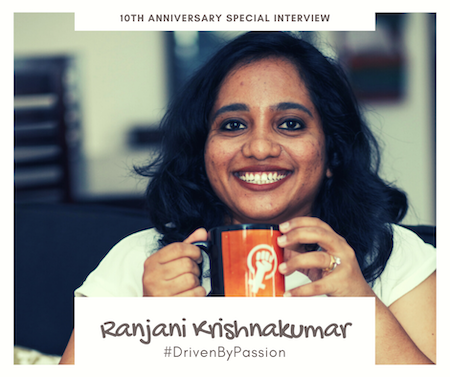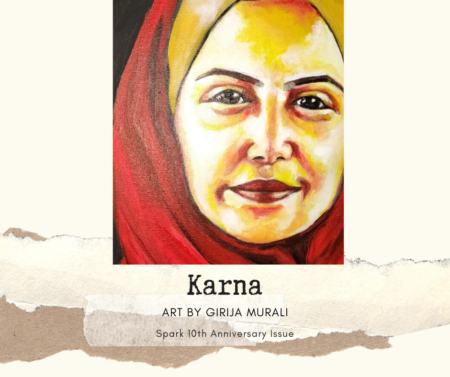An interview with Ranjani Krishnakumar
We catch up with Ranjani Krishnakumar, writer and marketer, about her passion for films and what it means to review movies!
Ranjani Krishnakumar is a writer/marketer in the real world. In her wonderland, she loves to analyse and dissect films threadbare. She also loves to watch mindless masala flicks (especially if Vishal is in it). Go figure.
What got you started – how did your interest in Tamil cinema go on to writing about it?
Like most Tamil-speaking people, I watched a lot of movies growing up. I had opinions — though, today, I’m embarrassed about most of them. 🙂 But none of my opinions really amounted to anything, in fact, I wouldn’t even say most of them were fully formed until I joined Manipal University for my post graduation.
I specialised in media studies. I spent a lot of time reading about cinema as an art form and its impact on people. We also watched a lot of movies as part of our curriculum — international, classics, contemporaries, documentaries etc. — which helped shape my ideas more precisely.
It shaped my personal interest into something more concrete. After college, without the community to sit around and debate films, I felt a strange void in my life. I knew I had an opinion / point of view that was uncommon, yet important. So, I started the blog and began writing.
You’re now a professional film reviewer! What was it like taking up your passion ‘professionally’?
I think I always thought of it as professional — in that, I always took it seriously. Even on the blog, I wouldn’t review a film if I didn’t watch it in the theatre. I wouldn’t give ratings to any movie, won’t tell people if they should/shouldn’t watch a movie. My point then was to point out how films are representing women (and sometimes other minorities) and how it affects our perception of them.
The biggest difference now, perhaps, is that it pays. Otherwise, I’ve had mostly the same freedom as if I were writing for my blog. My editors have been extremely kind, never once asking me to change an opinion or have a different point of view. If anything, as a professional reviewer, I’ve voluntarily made myself kinder — I try not to dismiss any film, and give each of them a fair chance.
You tend to use a feminist lens to analyse many movies – how has it been weaving together your passion for cinema with your feminism (especially for a film industry that is heavily patriarchal)?
That’s the thing. I had no passion for filmmaking — in that I never wanted to make a film or influence it directly. I always saw myself as a film journalist, if you will: As someone who holds the film industry to higher standards. Feminist lens fit perfectly into that scheme of things.
I worked for a short while with film director C S Amudhan as a junior writer. I realised there that all the screaming we do online hardly ever reaches the inner circles. What we’d have written off as a debate that was over five years ago, still hasn’t even reached most people. When I left that gig, I told myself that I’ll work harder to get my work in the hands of existing and future writers. In fact, recently, Subha, a freelance journalist told me that she took my review of Kaithi to the film’s director. I don’t know what he’s doing with it. But if he thinks about it even for a moment, it’s a great start.
What challenges have you faced reviewing films (within or from outside)? What keeps you going?
Does being called names on blog comments count as a challenge? Because apart from random trolling and advice about calming down, I’ve faced nothing else.
What keeps me going is the change I see. When people tell me, “whoa, I didn’t think of that!” I feel a sense of purpose to what I do. A friend pinged me saying, “I’m seeing misogyny everywhere in films today, what have you done to me!” 🙂 He means well!
But also, I’ve grown so much as a writer. Five to six years ago, my opinions were probably naive, somewhat unconsidered. Like me reacting in anger to something. Today, I take the time to think and consider what I say. Cinema is an important part of the Tamil people. Just being a tiny speck in that ecosystem gives me a sense of belonging.
What hopes do you have for Tamil cinema in the new decade?
Oh, I’m very hopeful. I think filmmakers are listening. Even those like Vijay Devarakonda or Sivakarthikeyan who keep finding ways to defend their films are doing so because they are listening to the arguments being made against it. It will take them longer than it takes you or me, but they will come around. Because we’re on the right side of history.
Pa Ranjith is a gift for Tamil cinema. I think in the next decade he will single-handedly revolutionise Tamil cinema (I hate to say just Dalit Cinema). Given the timbre of today’s society, I also think cinema will become more political, and that’s a great thing.
I am not seeing many women rush to make films today, and I hope they will in the next decade — we can’t have feminist films if a more diverse group of women, trans and queer people aren’t making them. I also believe that OTT platforms will stream more documentaries and indie films — Leena Manimekalai’s ‘Maadathy’ or Vaishnavi Sundar’s ‘But What Was She Wearing’ needs a much larger audience. They will find that online, I hope.
My one hope for myself is that I will get to watch more ‘great films’ than the ‘kuppai padams’ I’ve found myself drawn towards in the last few years. I want to move my film-writing away from criticising bad films to appreciating good films. *fingers crossed*
(Interview by Spark Editors)






